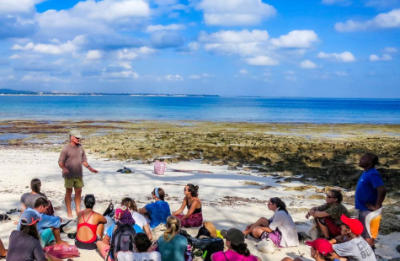Education Abroad Academic Advising
We are dedicated to facilitating early and thorough planning concerning academic pursuits abroad and degree progression for science and engineering students. Throughout this planning process, Education Abroad Advisors guide you in establishing academic objectives and exploring how studying abroad can help achieve these goals.
/0x226:4032x2798/prod01/channel_34/media/seattle-university/academics/education-abroad/photos/Picture2.jpg)
Resources for College of Science and Engineering
Seattle University offers a diverse range of SU-Sponsored, SU-Exchange, and Faculty-Led programs around the world. This guide outlines recommended courses for consideration during international study. As students take an active role in their academic journey, we offer comprehensive resources for academic planning and encourage collaboration with their Academic Advisors to explore and select the most suitable options for their abroad experience. Explore the full list of programs: Explore Programs!
Education Abroad & Academic Advising
An important supporter of the student experience abroad is the academic advisor. During the Exploration phase, students should discuss their desire to study abroad with their advisor to determine the best term for their experience, identify courses to complete abroad, and plan their remaining academic coursework to ensure timely degree completion. Additionally, students can review Seattle University's program requirements to identify which upper-level major courses they need to complete at the university.
- Review your Program Evaluation by going to Plan your Degree and Schedule your courses on MySeattleU
- Explore Undergraduate Science and Engineering Program Requirements - Sample 4-year and 2-year plans
- Select the desired program card, scroll down to learn the Degree at a Glance, select the degree type
When identifying courses to complete abroad, the EAO Historic Course Equivalency Search, can provide insight into courses that other students have previously taken. Although this list is not exhaustive, it can help students estimate the likelihood of similar courses being offered in the future.
Seattle University students typically go abroad Fall Semester/Fall Quarter, and depending on student's majors, Science and Engineering Undergraduate Students go abroad during:
- 2nd Year
- Summers
However, this may vary by major, view specific recommended abroad term in Major Recommendations below highlighted programs section
Students must meet with their academic advisor to discuss their individualized academic degree plan to determine the best term to go abroad.
Highlighted Programs
Consult the program's website for up-to-date course listings. All SU-Sponsored, SU-Exchange, and Non-SU courses taken abroad must be approved by Seattle University Academic Departments prior to going abroad. Contact Education Abroad Office for more information about costs and application steps.
/0x0:382x508/prod01/channel_34/media/seattle-university/academics/education-abroad/photos/cards---photos/3.png)
Study in New Zealand
A SU-Sponsored Program at University of Auckland with a variety of STEM courses to choose from.
/0x0:382x508/prod01/channel_34/media/seattle-university/academics/education-abroad/photos/cards---photos/2.png)
Sogang University Exchange
A SU-Exchange Program in Seoul, South Korea. Complete UCOR and Computer Science or Engineering Courses at Sogang University.
/0x0:382x508/prod01/channel_34/media/seattle-university/academics/education-abroad/photos/cards---photos/1.png)
Study in Stellenbosch
A SU-Sponsored program in at Stellenbosch University, South African's leading research institution.
Major/Minor Specific Recommendations
Highlighted Program for B.A. Biology (Only as an example and not guaranteed)
 On SU-Sponsored SIT Global Health and Human Rights in Kenya, students are able to take Comparative Healthcare Systems, Kiswahili, Epidemiology in Kenya, and develop an Independent Study Project within their own interest (Neglected Tropical Diseases in Western Kenya, Maternal and Child Health, etc.)
On SU-Sponsored SIT Global Health and Human Rights in Kenya, students are able to take Comparative Healthcare Systems, Kiswahili, Epidemiology in Kenya, and develop an Independent Study Project within their own interest (Neglected Tropical Diseases in Western Kenya, Maternal and Child Health, etc.)
Highlighted Program for B.S. Biology (Only as an example and not guaranteed)
 On Sogang University Exchange Program in Seoul, South Korea, students can take UCOR 3100, UCOR 3400, PHYS 1050+ PHYS 1051, Korean Language
On Sogang University Exchange Program in Seoul, South Korea, students can take UCOR 3100, UCOR 3400, PHYS 1050+ PHYS 1051, Korean Language
Recommendation for Biology B.A.
Students majoring in a BA in Biology have more flexibility as there are more general electives built into the academic plan. Students are able to take courses that are relevant to their academic/career goals. For example, perhaps the education abroad goal is to have more field experience, therefore taking an internship or research course would count as a general elective as well as help the student gain hands-on experience in their field of study.
Suggested Terms Aboard (Seattle University students usually go abroad Fall Semester/Quarter)
Since there is more flexibility, BA in Biology students are able to go abroad during their:
- 2nd year
- 3rd year
- Summers
Suggested Courses To Take Abroad (subject to term and courses changes by program/university)
- UCOR IIIs
- General Electives
- Biology Major Electives
- Science Electives
Recommendation for Biology B.S.
Since students majoring in a B.S. in Biology will have fewer general electives, finding a program that might have 1-2 biology major courses would be a simple way to stay on track
Suggested Terms Aboard (Seattle University students usually go abroad Fall Semester/Quarter)
Since there is more flexibility, BA in Biology students are able to go abroad during their:
- 3rd year - Fall Semester
- Summers
Suggested Courses To Take Abroad (subject to term and courses changes by program/university)
- UCOR IIIs
- Biology Major Electives
- Department Requirements
- General Electives
Recommendation for Biology Minor
Suggested Terms Aboard (Seattle University students usually go abroad Fall Semester/Quarter)
Depending on the student's Major, Biology minor students typically go abroad during:
- 2nd Year
- 3rd Year
- 4th Year
- Summer
Suggested Courses To Take Abroad (subject to term and courses changes by program/university)
- UCOR IIIs (Credits from UCOR courses may simultaneously fulfill Core and minor requirements)
- Biology Electives (= UCOR 3800)
*Detailed planning will have to be planned out for smooth course sequencing upon return. Students are able to go abroad during Fall Semester to complete the first courses (ie. BIOL 1610 & BIOL 1611) abroad and return to SU to complete the series, depending on the abroad program.
In the past, students in this major have been able to take the following courses abroad, this is not a comprehensive list of courses taken abroad and is subject to change. You will still have to meet with your Academic Advisor to go over your specific academic plan.
- BIOL 1610 - Biology I: Molecular and Cellular Biology
- BIOL 1611 - Biology Lab I
- BIOL 1620 - Biology II: Evolution and Ecology
- BIOL 1621 - Biology Lab II
- BIOL 1630 - Biology III: Physiology and Development
- BIOL 1631 - Biology Lab III
- Biology Electives (examples of courses previously approved)
- BIOL 2520 - Plant Systematics
- BIOL 2600 - Ecology
- BIOL 3500 - Evolution
- BIOL 3650 - Marine Biology
- BIOL 3800 - Animal Behavior
- BIOL 3820 - Neurobiology
- BIOL 4620 - Marine Ecology
- BIOL 4640 - Aquatic Ecology
- BIOL 4650 - Conservation Biology
- BIOL 4660 - Tropical Ecology
- BIOL 4670 - Wildlife Biology
- BIOL Electives - as approved by Departmental Approver
Highlighted Program for B.A. Computer Science (Only as an example and not guaranteed)
 On SU-Sponsored Open Campus - 12 Weeks, students are able to take UCOR 3400, UCOR 3600, and an internship seminar with accompanying part-time internship opportunity in their preferred field.
On SU-Sponsored Open Campus - 12 Weeks, students are able to take UCOR 3400, UCOR 3600, and an internship seminar with accompanying part-time internship opportunity in their preferred field.
Highlighted Program for B.S. Computer Science (Only as an example and not guaranteed)
 On Sogang University Exchange Program in Seoul, South Korea, students can take UCOR 3100, UCOR 3400, PHYS 1050+ PHYS 1051, Programming Languages
On Sogang University Exchange Program in Seoul, South Korea, students can take UCOR 3100, UCOR 3400, PHYS 1050+ PHYS 1051, Programming Languages
Recommendation for Computer Science B.A.
Students majoring in a B.A. in Computer Science have more flexibility as there are more general electives built into the academic plan. Students are able to take courses that are relevant to their academic/career goals. For example, perhaps the education abroad goal is to have more field experience, therefore taking an internship or research course would count as a general elective as well as help the student gain hands-on experience in their field of study.
Suggested Terms Aboard (Seattle University students usually go abroad Fall Semester/Quarter)
Since there is more flexibility, BA in Computer Science students are able to go abroad during their:
- 2nd year
- 3rd year
- Summers
Suggested Courses To Take Abroad (subject to term and courses changes by program/university)
- UCOR IIIs
- General Electives
- Computer Science Major Electives
- Department Requirements (Math)
Recommendation for Computer Science B.S.
Since students majoring in a B.S. in Computer Science will have fewer general electives, depending on what courses remain, students may want to focus on their UCOR III courses.
Suggested Terms Aboard (Seattle University students usually go abroad Fall Semester/Quarter)
BS in Computer Science students are able to go abroad during their:
- 2nd year - Fall Semester/Spring Quarter
- 3rd year - Fall Semester/Spring Quarter
- Summers
Suggested Courses To Take Abroad (subject to term and courses changes by program/university)
- UCOR IIIs
- General Electives
- Computer Science Major Electives
- Department Requirements (Math, Physics, Biology, Chemistry)
Recommendation for Computer Science Minor
Suggested Terms Aboard (Seattle University students usually go abroad Fall Semester/Quarter)
Depending on the student's Major, Biology minor students typically go abroad during:
- 2nd Year
- 3rd Year
- 4th Year
- Summer
Suggested Courses To Take Abroad (subject to term and courses changes by program/university)
- UCOR IIIs (Credits from UCOR courses may simultaneously fulfill Core and minor requirements)
- Computer Science Electives (= UCOR 3800)
In the past, students in this major have been able to take the following courses abroad, this is not a comprehensive list of courses taken abroad and is subject to change. You will still have to meet with your Academic Advisor to go over your specific academic plan.
- Computer Science Electives (examples of courses previously approved)
- CPSC 1220 - Data-Driven Programming
- CPSC 2430 - Data Structures
- CPSC 2500 - Computer Organization
- CPSC 2600 - Foundations of Computer Science
- CPSC 3300 - Foundations of Databases
- CPSC 3400 - Languages and Computation
- CPSC 3500 - Computing Systems
- CPSC 3700 - The Art of Web Design
- CPSC 4100 - Design and Analysis of Algorithms
- CPSC 4250 - Mobile Software Development
- CPSC 4270 - Graphics/Game Project
- CPSC 4310 - Machine Learning
- CPSC 4530 - Embedded Systems
- CPSC 4710 - Security in Computing
- CPSC Electives - as approved by Departmental Approver
Have Questions?
Kirsti advises College of Science & Engineering Students
Kirsti Ruud
Director
/0x0:360x460/prod01/channel_34/media/seattle-university/academics/education-abroad/photos/2.png)
 On
On  On SU-Sponsored
On SU-Sponsored  On SU-Sponsored Program at
On SU-Sponsored Program at  On SU-Exchange
On SU-Exchange  On SU-Sponsored
On SU-Sponsored  On SU-Sponsored
On SU-Sponsored  On SU-Sponsored
On SU-Sponsored